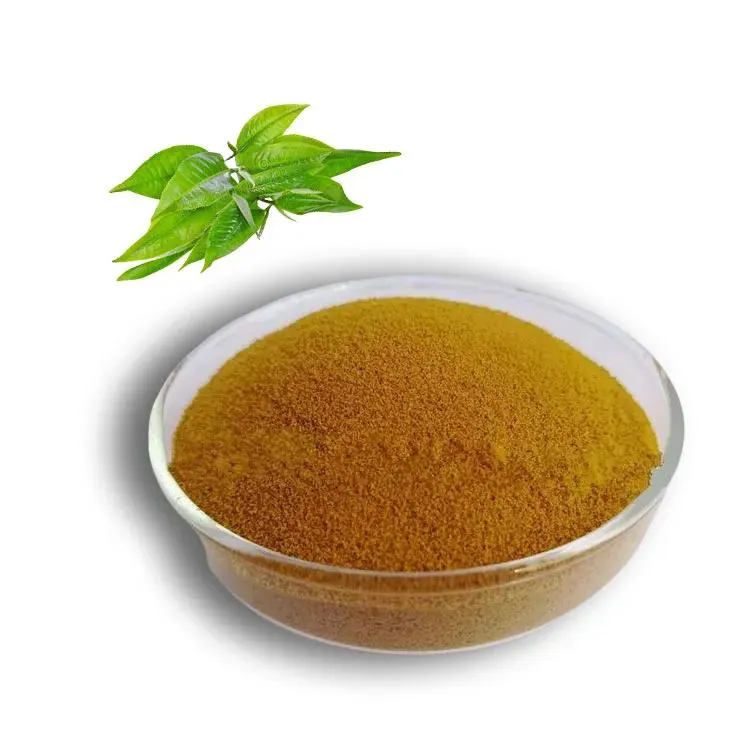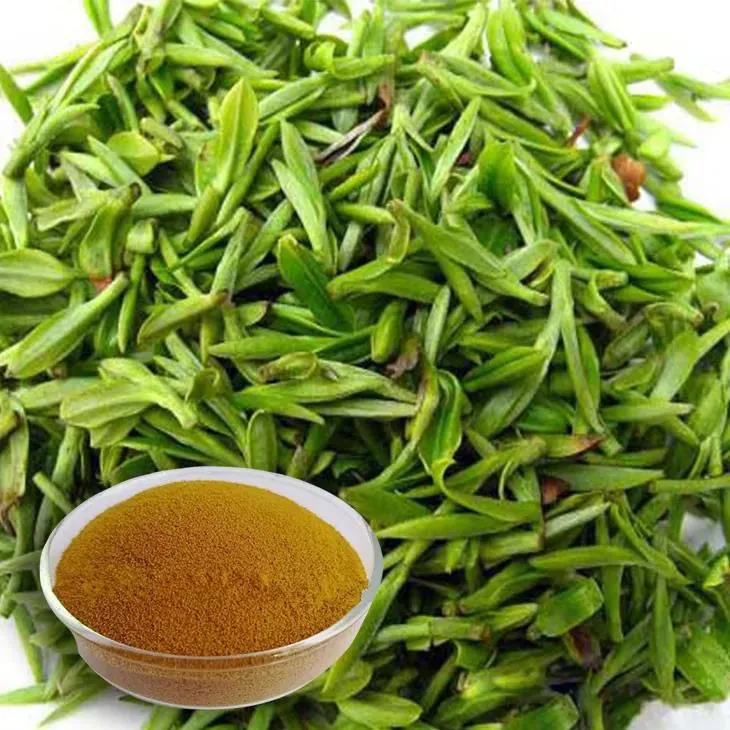- 0086-571-85302990
- sales@greenskybio.com
The Cutting Edge of Health: Current Research and Future Directions of Resveratrol and Green Tea Extract
2024-08-09

1. Introduction
In the pursuit of better health and well - being, natural substances have been increasingly studied for their potential benefits. Resveratrol and Green Tea Extract are two such substances that have captured the attention of the scientific community. Resveratrol, a compound found predominantly in grapes and red wine, has been linked to a variety of health - promoting effects. Green Tea Extract, derived from the leaves of the Camellia sinensis plant, is also known for its numerous health - related properties. This article aims to comprehensively review the current research on these two substances, including their mechanisms of action, and to explore the future directions of research and potential applications in the fields of medicine and wellness.

2. Resveratrol
2.1 Sources and Chemical Properties
Resveratrol is a stilbenoid, a type of natural phenolic compound. It is found in high concentrations in the skins of grapes, especially in red grapes, as well as in other fruits such as blueberries and cranberries. However, it is most commonly associated with red wine due to the fermentation process that extracts the compound from the grape skins. Chemically, resveratrol exists in two isomeric forms: cis - resveratrol and trans - resveratrol. The trans - isomer is the more stable and biologically active form.
2.2 Health Benefits
2.2.1 Anti - aging Effects
Resveratrol has been proposed to have anti - aging properties. One of the mechanisms through which it may exert this effect is by activating sirtuins. Sirtuins are a family of proteins that play a role in regulating cellular metabolism, DNA repair, and stress response. By activating sirtuins, resveratrol may help to maintain the integrity of cells and delay the aging process. For example, in some in - vitro and in - vivo studies, resveratrol has been shown to increase the lifespan of certain organisms, such as yeast, worms, and flies.
2.2.2 Antioxidant Activity
Resveratrol is a powerful antioxidant. It can scavenge free radicals, which are highly reactive molecules that can cause damage to cells and tissues. Free radicals are generated as a by - product of normal cellular metabolism, as well as in response to environmental factors such as pollution, radiation, and smoking. By neutralizing free radicals, resveratrol helps to protect cells from oxidative stress, which is associated with a variety of diseases, including cancer, heart disease, and neurodegenerative disorders.
2.2.3 Anti - inflammatory Effects
Inflammation is a natural immune response that helps the body to fight off infections and repair damaged tissues. However, chronic inflammation can lead to a variety of health problems. Resveratrol has been shown to have anti - inflammatory properties. It can inhibit the production of pro - inflammatory cytokines, such as interleukin - 1β (IL - 1β) and tumor necrosis factor - α (TNF - α), and also modulate the activity of inflammatory cells, such as macrophages. This anti - inflammatory activity may contribute to its potential role in preventing and treating chronic diseases.
2.3 Mechanisms of Action
Resveratrol exerts its effects through multiple mechanisms. One of the key mechanisms is its interaction with various signaling pathways in the cell. For example, it can activate the AMP - activated protein kinase (AMPK) pathway. AMPK is an important energy - sensing enzyme that regulates cellular energy metabolism. By activating AMPK, resveratrol can increase fatty acid oxidation, improve insulin sensitivity, and regulate glucose metabolism. Additionally, resveratrol can also modulate the nuclear factor - κB (NF - κB) pathway, which is a major regulator of inflammation. By inhibiting NF - κB activation, resveratrol can reduce the production of pro - inflammatory molecules.

3. Green Tea Extract
3.1 Composition and Sources
Green tea extract is rich in polyphenols, particularly catechins. The major catechins found in green tea include epigallocatechin - 3 - gallate (EGCG), epicatechin - 3 - gallate (ECG), epigallocatechin (EGC), and epicatechin (EC). Green tea is made from the leaves of the Camellia sinensis plant, which is native to Asia. Different types of green tea, such as matcha, sencha, and gyokuro, may vary in their catechin content depending on factors such as the variety of the plant, the growing conditions, and the processing methods.
3.2 Health Benefits
3.2.1 Heart Health Promotion
Green tea extract has been shown to have beneficial effects on heart health. One of the mechanisms is through its antioxidant activity. By reducing oxidative stress, it can help to protect the heart from damage. Additionally, green tea extract may also improve lipid profiles. For example, some studies have shown that it can lower LDL - cholesterol (the "bad" cholesterol) and triglyceride levels, while increasing HDL - cholesterol (the "good" cholesterol). It may also have anti - platelet and anti - coagulant effects, which can help to prevent blood clots and reduce the risk of heart attacks and strokes.
3.2.2 Weight Management
Green tea extract has been investigated for its potential role in weight management. The catechins in green tea, particularly EGCG, may increase thermogenesis, which is the process by which the body generates heat. This can lead to an increase in energy expenditure. In addition, green tea extract may also inhibit the absorption of dietary fat in the intestine. Some clinical studies have shown that green tea extract supplementation can lead to a modest reduction in body weight and body fat percentage.
3.2.3 Cancer Prevention
There is growing evidence suggesting that green tea extract may have cancer - preventive properties. The antioxidant and anti - inflammatory activities of green tea extract may play a role in this regard. For example, EGCG has been shown to inhibit the growth and proliferation of cancer cells in vitro and in vivo. It can also induce apoptosis (programmed cell death) in cancer cells and inhibit angiogenesis (the formation of new blood vessels that supply tumors). However, more research is needed to fully understand the potential of green tea extract in cancer prevention and treatment.
3.3 Mechanisms of Action
The mechanisms by which green tea extract exerts its health benefits are complex and involve multiple pathways. One of the main mechanisms is related to its antioxidant activity. The catechins in green tea can scavenge free radicals and prevent oxidative damage to cells. Another important mechanism is the modulation of cell signaling pathways. For example, EGCG can inhibit the activity of certain kinases, such as protein kinase C (PKC) and mitogen - activated protein kinases (MAPKs), which are involved in cell growth, proliferation, and survival. Green tea extract can also regulate gene expression, for example, by modulating the expression of genes involved in lipid metabolism, inflammation, and cancer.

4. Current Research on Resveratrol and Green Tea Extract
4.1 Clinical Trials
There have been numerous clinical trials investigating the effects of resveratrol and green tea extract on human health.
- For resveratrol, some clinical trials have focused on its potential role in metabolic syndrome. For example, a study investigated the effects of resveratrol supplementation on insulin sensitivity in patients with type 2 diabetes. The results showed that resveratrol may improve insulin sensitivity, although more research is needed to confirm these findings.
- In the case of green tea extract, clinical trials have been carried out to evaluate its effects on weight loss. Some studies have reported that green tea extract supplementation can lead to a small but significant reduction in body weight and body fat, especially when combined with exercise and a healthy diet.
4.2 Pre - clinical Studies
Pre - clinical studies using cell lines and animal models have provided valuable insights into the mechanisms of action of resveratrol and green tea extract.
- Resveratrol has been studied in animal models of neurodegenerative diseases, such as Alzheimer's and Parkinson's diseases. In these models, resveratrol has shown potential in reducing oxidative stress, inflammation, and amyloid - β plaque formation (in the case of Alzheimer's disease), which suggests its possible use in the prevention and treatment of these diseases.
- Green tea extract has been extensively studied in animal models of cancer. For example, in mouse models of breast cancer, green tea extract has been shown to inhibit tumor growth and metastasis. These pre - clinical studies provide a basis for further clinical trials to explore the potential of green tea extract in cancer therapy.
5. Future Directions
5.1 Further Scientific Exploration
- There is a need for more in - depth studies on the long - term effects of resveratrol and green tea extract. While many short - term studies have shown promising results, the long - term safety and efficacy of these substances are still not fully understood.
- Future research should also focus on exploring the potential synergistic effects between resveratrol and green tea extract. Combining these two substances may result in enhanced health benefits, but more research is needed to determine the optimal ratios and formulations for such combinations.
- Another area of future research is to investigate the role of resveratrol and green tea extract in personalized medicine. Different individuals may respond differently to these substances based on their genetic makeup, lifestyle, and underlying health conditions. Understanding these individual differences will help to develop more targeted and effective treatment strategies.
5.2 Potential Applications in Medicine and Wellness
- In medicine, resveratrol and green tea extract may have potential applications in the development of new drugs or as adjuvants in existing therapies. For example, their anti - inflammatory and antioxidant properties may be useful in the treatment of chronic inflammatory diseases and cancer.
- In the wellness industry, these substances may be incorporated into functional foods, dietary supplements, and skincare products. For example, green tea extract is already widely used in skincare products for its antioxidant and anti - inflammatory properties, which can help to protect the skin from damage and aging. Resveratrol may also be added to dietary supplements aimed at promoting anti - aging and overall health.
6. Conclusion
Resveratrol and green tea extract are two natural substances with a wide range of potential health benefits. Current research has provided evidence for their anti - aging, antioxidant, anti - inflammatory, and disease - preventive properties. However, more research is needed to fully understand their mechanisms of action, long - term effects, and potential applications in medicine and wellness. Future research should focus on filling these gaps in knowledge and exploring the possibilities of these substances in improving human health.
FAQ:
What are the main health benefits of resveratrol?
Resveratrol has been associated with anti - aging, antioxidant, and anti - inflammatory properties. It may also play a role in protecting against certain diseases, although more research is needed to fully understand these potential benefits.
How does green tea extract promote heart health?
Green tea extract is rich in catechins. These catechins may help reduce cholesterol levels, improve blood vessel function, and lower blood pressure, all of which contribute to better heart health.
What are the mechanisms of action for resveratrol?
Resveratrol is thought to work through multiple mechanisms. It can act as an antioxidant, scavenging free radicals in the body. It may also influence gene expression related to inflammation and cell survival, although the exact details are still being investigated.
Can green tea extract really help with weight management?
There is some evidence that green tea extract can play a role in weight management. The catechins in it may increase metabolism and fat oxidation. However, it is not a magic solution and should be combined with a healthy diet and regular exercise.
What are the future directions for research on resveratrol and green tea extract?
Future research may focus on further elucidating their mechanisms of action, exploring potential synergistic effects when used together, and conducting more clinical trials to determine their efficacy and safety for various health conditions. There may also be investigations into new delivery methods to improve their bioavailability.
Related literature
- Resveratrol: A Review of Its Anti - Aging and Anti - Inflammatory Effects"
- "Green Tea Extract and Heart Health: Current Understanding and Future Prospects"
- "The Role of Resveratrol in Cancer Prevention: Mechanisms and Research Updates"
- "Green Tea Catechins and Weight Management: A Comprehensive Review"
- ▶ Hesperidin
- ▶ citrus bioflavonoids
- ▶ plant extract
- ▶ lycopene
- ▶ Diosmin
- ▶ Grape seed extract
- ▶ Sea buckthorn Juice Powder
- ▶ Beetroot powder
- ▶ Hops Extract
- ▶ Artichoke Extract
- ▶ Reishi mushroom extract
- ▶ Astaxanthin
- ▶ Green Tea Extract
- ▶ Curcumin Extract
- ▶ Horse Chestnut Extract
- ▶ Other Problems
- ▶ Boswellia Serrata Extract
- ▶ Resveratrol Extract
- ▶ Marigold Extract
- ▶ Grape Leaf Extract
- ▶ blog3
- ▶ blog4
- ▶ blog5
-
Grapefruit Seed Extract Powder
2024-08-09
-
Camu Camu Extract
2024-08-09
-
Selenium yeast
2024-08-09
-
Curcumin
2024-08-09
-
Grape Seed Extract
2024-08-09
-
Scutellaria Extract
2024-08-09
-
Curcuma Longa Extract
2024-08-09
-
Acerola Juice Powder
2024-08-09
-
Hawthorn powder
2024-08-09
-
Andrographis Paniculata Extract Powder
2024-08-09





















